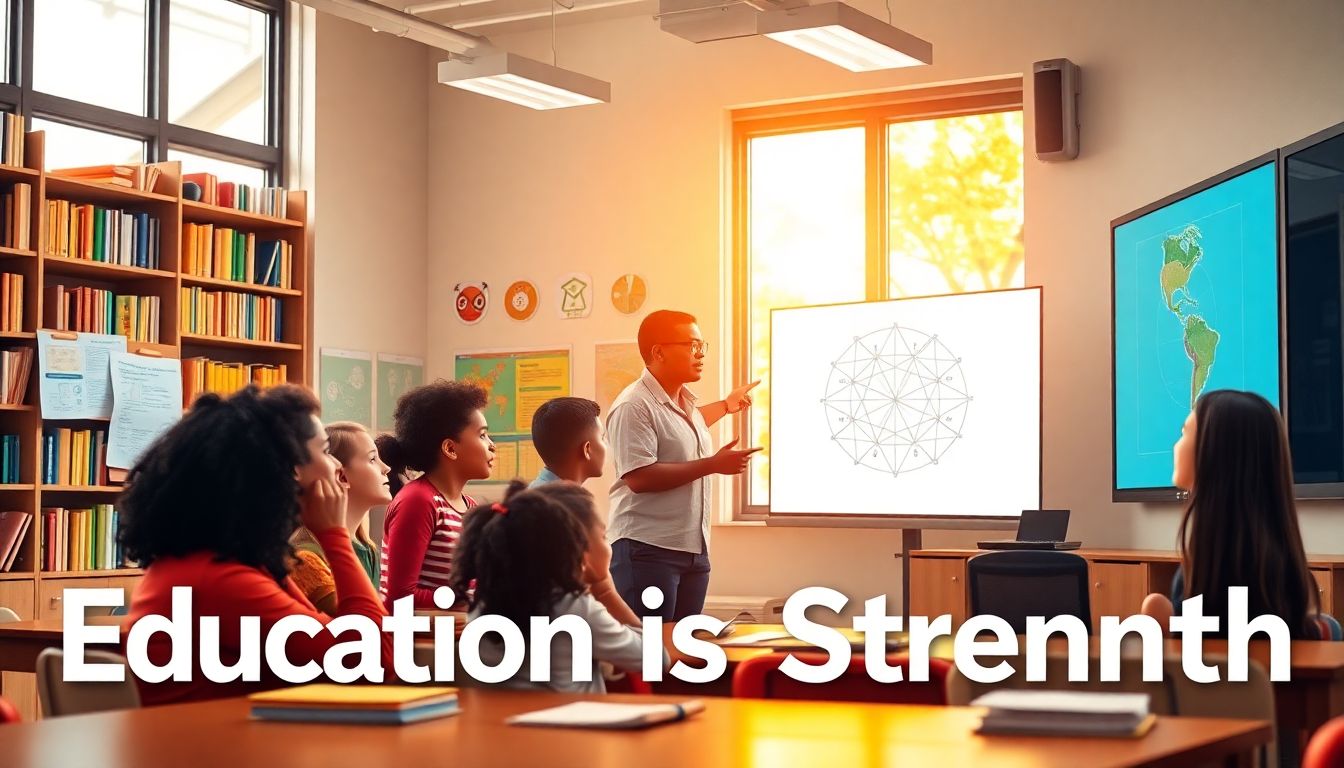Education Is Strength: Unlocking Potential for Personal and Societal Growth
Imagine a world where anyone, no matter their background, has the chance to learn and grow. That’s the promise of education. Education isn’t just about textbooks; it’s about opening doors to a better life. When people gain knowledge, they become stronger, more confident, and better equipped to face life's challenges. However, many parts of the world still lack access to quality education. Addressing this gap can unlock potential in individuals and change entire communities.

Education Is Strength: Unlocking Potential for Personal and Societal Growth
Introduction
Imagine a world where anyone, no matter their background, has the chance to learn and grow. That’s the promise of education. Education isn’t just about textbooks; it’s about opening doors to a better life. When people gain knowledge, they become stronger, more confident, and better equipped to face life's challenges. However, many parts of the world still lack access to quality education. Addressing this gap can unlock potential in individuals and change entire communities.
The Impact of Education on Personal Development
Personal Empowerment and Confidence
Education helps us understand ourselves better. It builds self-awareness and encourages us to set goals. When we learn new things, we feel more confident about our abilities. This sense of empowerment motivates us to keep pushing forward. Take Malala Yousafzai — her journey from a young girl in Pakistan to a global advocate shows how education can change lives. Her story proves that education fuels resilience and inspires others.
Career Opportunities and Economic Mobility
Higher education often leads to better jobs. Data shows that with more schooling, adults are more likely to find steady employment and earn higher incomes. Education opens doors to careers that might seem out of reach otherwise. To grow professionally, pursue continuous learning—online courses, workshops, or certifications keep you ahead in today’s fast-changing job market.
Critical Thinking and Problem-Solving Skills
Good education trains your mind to think deeply. It sharpens analytical skills and encourages creative solutions. Experts in education say that critical thinking is essential for innovation and progress. When you ask questions and analyze information, you become a better problem solver. So, learning isn’t just about facts—it’s about developing skills to navigate the world.
Education as a Catalyst for Societal Progress
Poverty Reduction and Economic Growth
Widespread literacy is linked to faster economic growth. Countries with high literacy rates tend to develop more quickly. For example, Rwanda’s investment in education after the 1994 genocide helped the country rebuild. Better education led to improved health, stronger communities, and economic recovery. Educated populations boost national progress.
Promoting Equality and Social Cohesion
Education can bridge gaps in society. It reduces gender disparities and promotes fairness. Many programs in developing countries work to get more girls into schools and STEM fields. When everyone, regardless of background, can learn, communities become more united. Education helps break down barriers and fosters inclusion.
Health and Wellbeing Improvements
People who are educated tend to make healthier choices. They understand health risks and follow better habits. Studies show that higher education levels link to lower child mortality and longer life expectancy worldwide. Knowledge about health empowers individuals and creates healthier societies.
Overcoming Barriers to Education
Socioeconomic Challenges
Poverty keeps many children out of school. Child labor and financial strains stop families from prioritizing education. To combat this, scholarships and financial aid programs help remove these barriers. Support systems must be in place so everyone can attend school.
Geographic and Cultural Barriers
Remote areas often lack schools and resources. Cultural beliefs may also hinder certain groups from seeking education. Technology offers solutions—mobile learning and online platforms bring lessons to underserved locations. We need creative ways to reach everyone.
Policy and Infrastructure Improvements
Governments and NGOs play a big role in improving access. Building schools, training teachers, and creating policies matter. Successful initiatives often involve community involvement. When leaders focus on educational infrastructure, more children can learn safely and comfortably.
The Future of Education: Innovations and Trends
Technology-Enabled Learning
Online platforms and AI tutors are transforming education. Students can learn anywhere, anytime. For example, Khan Academy reaches millions around the world with free lessons. Virtual classrooms make learning more accessible than ever.
Personalized and Lifelong Education
Adaptive systems tailor lessons to each learner’s pace. Lifelong learning becomes a norm—people continue developing skills long after school. Enrolling in online courses and certifications keeps us adaptable in a changing world.
Global Initiatives and Collaborative Efforts
UNESCO’s goal for quality education pushes nations to improve. International collaborations bring resources and ideas. Everyone can contribute—whether through volunteering, donations, or spreading awareness about education’s importance.
Conclusion
Education is more than just gathering facts. It’s a powerful tool that builds strength within individuals and lifts entire societies. Investing in education today means unlocking the potential of tomorrow. We must work to make good quality education accessible to all. When everyone learns, everyone benefits. Let’s stand together and support a future where education is a right, not a privilege. Together, we can create a stronger, smarter, more equal world.



 VARSHITHA
VARSHITHA